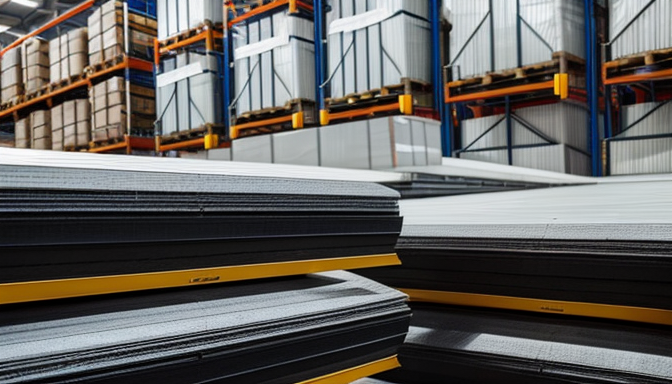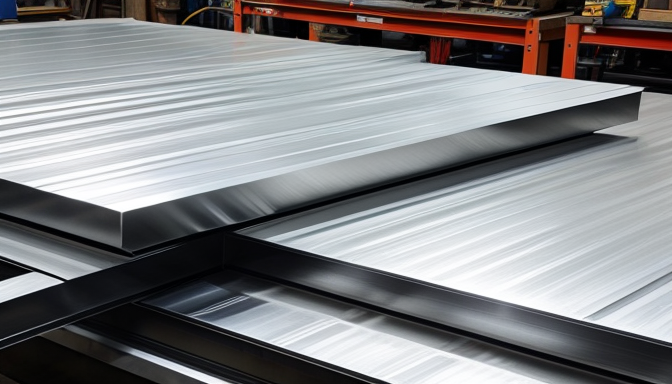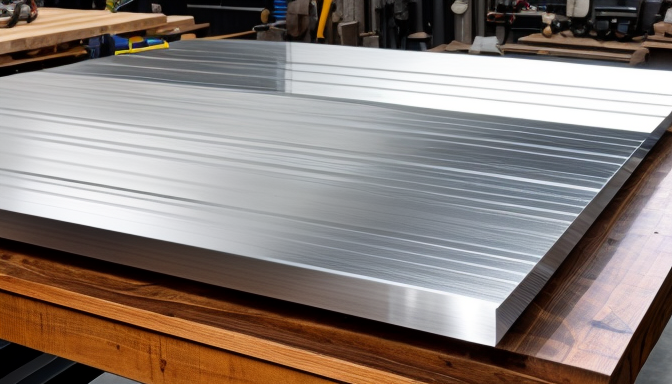S275JR steel sheets are a popular choice in various industries due to their impressive balance of strength and ductility. These sheets are made from structural steel, specifically designed to meet the needs of construction and manufacturing. But what makes them so special? Let’s dive into the details!
First off, S275JR steel sheets are known for their versatility. They can be used in a wide range of applications, from building frames to bridges. Imagine constructing a building; you need materials that can withstand stress and strain. That’s where S275JR comes in. Its ability to handle heavy loads makes it a go-to material for engineers and builders alike.
Now, let’s talk about the price. Understanding the cost factors of S275JR steel sheets is essential for anyone planning a project. Prices can fluctuate based on market demand, the thickness of the sheets, and the supplier. For instance, if you’re buying in bulk, you might snag a better deal. It’s always a good idea to shop around and compare prices. You wouldn’t want to overpay for something that’s essential for your project, right?
Weight is another critical aspect. Have you ever tried to lift a heavy object? It’s not easy! The same principle applies to steel sheets. The weight of S275JR sheets affects how they are transported and used in construction. Heavier sheets may require special equipment for lifting and moving. This can impact your overall project timeline and costs. So, understanding the weight of these sheets helps in planning logistics effectively.
When it comes to properties, S275JR steel sheets stand out. They are not just strong; they also offer good weldability and machinability. This means you can easily cut and shape them to fit your needs. Think of it like molding clay. You can create various forms without losing the material’s integrity. This property is especially useful in custom projects where specific dimensions are required.
Speaking of dimensions, S275JR steel sheets come in various sizes. This flexibility allows for customization based on project requirements. Whether you need a small sheet for a minor repair or large sheets for a major construction project, there’s likely a size that fits your needs. Here’s a quick look at some common sizes:
| Thickness (mm) | Width (mm) | Length (mm) |
|---|---|---|
| 3 | 1000 | 2000 |
| 5 | 1250 | 2500 |
| 10 | 1500 | 3000 |
In conclusion, S275JR steel sheets are a reliable choice for many projects. Their balance of strength, weight, and versatility makes them indispensable in construction and manufacturing. By understanding their properties, pricing, and available sizes, you can make informed decisions for your next project. So, whether you’re an engineer, contractor, or DIY enthusiast, S275JR steel sheets might just be what you need!
S275JR Steel Sheet Price
Understanding the pricing factors for S275JR steel sheets is crucial for budget planning in construction and manufacturing. Prices can vary widely based on several elements. For instance, the quality of the steel, the thickness of the sheets, and even the supplier’s location can all play a significant role in determining cost. Have you ever wondered why two suppliers might quote different prices for seemingly the same product? It often comes down to these factors.
Market trends also influence the price of S275JR steel sheets. When demand is high, prices tend to rise. Conversely, during periods of low demand, prices may drop. It’s a classic case of supply and demand. For construction projects, understanding these trends can help in making timely purchases, potentially saving a considerable amount of money.
Here’s a quick breakdown of some common factors affecting the price:
- Material Quality: Higher quality steel often commands a higher price.
- Thickness: Thicker sheets usually cost more due to the increased amount of material.
- Supplier Location: Shipping costs can add to the overall price, especially for remote locations.
- Market Demand: Prices can fluctuate based on current market conditions.
To give you a clearer picture, let’s look at a simple price range table for S275JR steel sheets based on common sizes:
| Sheet Size (mm) | Approximate Price (per ton) |
|---|---|
| 1000 x 2000 | $600 – $800 |
| 1500 x 3000 | $700 – $900 |
| 2000 x 4000 | $800 – $1000 |
As you can see, the price varies not just by size but also by the thickness and quality of the steel. When planning your project, it’s wise to get quotes from multiple suppliers. This way, you can compare prices and ensure you’re getting the best deal. Remember, it’s not just about the lowest price; consider the quality and reliability of the supplier as well.
In conclusion, being informed about the pricing of S275JR steel sheets can significantly impact your project’s budget and overall success. Keep an eye on market trends and don’t hesitate to ask suppliers about their pricing structures. Knowledge is power, especially when it comes to making cost-effective decisions in construction and manufacturing!

S275JR Steel Sheet Weight
The weight of S275JR steel sheets is an essential factor to consider, especially in construction and manufacturing. Why is that? Well, the weight directly impacts transportation costs, structural design, and overall project logistics. When you’re planning a project, every detail counts, and the weight of your materials can make or break your budget.
Generally, the weight of a steel sheet can be calculated using the formula:
Weight (kg) Length (mm) x Width (mm) x Thickness (mm) x Density (kg/m³) / 1,000,000
Here, the density of S275JR steel is approximately 7850 kg/m³. This means that if you know the dimensions of your steel sheet, you can easily figure out its weight. For instance, a sheet that is 2000 mm long, 1000 mm wide, and 10 mm thick would weigh about:
| Length (mm) | Width (mm) | Thickness (mm) | Weight (kg) |
|---|---|---|---|
| 2000 | 1000 | 10 | 157 |
Understanding the weight helps in several ways:
- Transportation: Heavier sheets require more robust vehicles and may increase shipping costs.
- Structural Design: Engineers must account for weight in their calculations to ensure stability and safety.
- Material Choices: Lighter materials might be preferred in some applications to reduce overall load.
Imagine you’re working on a large construction site. You order several tons of steel sheets. If you miscalculate the weight, you could face delays in delivery or even structural issues later on. No one wants that headache! So, knowing the weight of S275JR steel sheets not only helps you plan better but also ensures that your project runs smoothly.
In conclusion, the weight of S275JR steel sheets is more than just a number. It’s a crucial aspect that affects logistics, design, and material selection. By keeping a close eye on this factor, you can save time and money while ensuring the integrity of your projects.
S275JR Steel Sheet Properties
The S275JR steel sheet is more than just a piece of metal; it’s a versatile material with impressive characteristics. Understanding its properties is essential for anyone involved in construction or manufacturing. So, what makes S275JR stand out? Let’s dive into its key features.
First off, the **strength** of S275JR steel is noteworthy. It has a minimum yield strength of 275 MPa. This means it can withstand significant loads without deforming. Imagine trying to hold up a heavy shelf. You need something strong, right? That’s where S275JR comes into play. It’s reliable, sturdy, and ready for tough tasks.
Another important property is its **ductility**. Ductility refers to how much a material can stretch before breaking. S275JR can be easily shaped and formed without cracking. This is crucial for projects that require intricate designs or specific dimensions. Think of it like molding clay. You can stretch and twist it, but it still holds together. This property allows for easier fabrication and installation, saving time and reducing waste.
Moreover, S275JR steel sheets exhibit good **weldability**. This means they can be easily welded to other materials without losing their strength. In construction, this is vital. It allows for the creation of strong joints that can handle heavy loads. Imagine building a bridge. The connections between parts need to be solid. S275JR ensures that these connections are reliable.
Another key aspect is **toughness**. S275JR steel performs well under low temperatures, making it suitable for various environments. Whether it’s a chilly winter day or a hot summer afternoon, this steel can handle it all. Its toughness ensures that it won’t become brittle, which is a significant advantage in many applications.
Let’s not forget about **corrosion resistance**. While S275JR isn’t stainless steel, it does have decent resistance to rust when properly treated. This makes it a good choice for outdoor applications. Think of it like a raincoat. It won’t keep you completely dry, but it helps you withstand the elements.
To summarize, here are the **key properties** of S275JR steel sheets:
- Strength: Minimum yield strength of 275 MPa
- Ductility: Easily shaped without cracking
- Weldability: Can be welded without losing strength
- Toughness: Performs well in low temperatures
- Corrosion Resistance: Decent resistance with proper treatment
In conclusion, the properties of S275JR steel sheets make them a top choice for many industries. Their strength, ductility, and toughness ensure they can handle various applications, from construction to manufacturing. If you’re considering materials for your next project, S275JR is definitely worth a closer look.

S275JR Steel Sheet Sizes
The size of S275JR steel sheets plays a crucial role in various industries, especially in construction and manufacturing. When you think about it, the right size can make all the difference in ensuring a project runs smoothly. Imagine trying to fit a large puzzle piece into a small space; it just doesn’t work, right? In the same way, using the correct dimensions for steel sheets is vital for structural integrity and efficiency.
Typically, S275JR steel sheets come in a range of standard sizes. These sizes are designed to meet the needs of different applications. Here’s a quick overview of some common dimensions:
| Thickness (mm) | Width (mm) | Length (mm) |
|---|---|---|
| 2 | 1000 | 2000 |
| 3 | 1250 | 2500 |
| 5 | 1500 | 3000 |
These dimensions can vary based on the supplier and specific project requirements. It’s essential to check with your supplier for the most accurate options available. Custom sizes can also be requested, allowing for flexibility in meeting project specifications. This means you can get sheets tailored to fit your unique needs, which can save time and reduce waste.
When selecting sizes, consider how they will impact your project. Larger sheets can reduce the number of seams and joints, which can enhance the overall strength of your structure. On the flip side, smaller sheets might be easier to handle and transport, especially in tight spaces. Think about your project layout, labor availability, and equipment capabilities.
In conclusion, understanding the sizes of S275JR steel sheets is essential for anyone involved in construction or manufacturing. Whether you’re planning a large-scale project or a small renovation, having the right dimensions can lead to better outcomes. Always consult with your supplier to explore all available options and find the best fit for your needs.
Frequently Asked Questions
- What is S275JR steel sheet?
S275JR steel sheet is a low carbon structural steel that is widely used in construction and manufacturing. It offers a good balance of strength and ductility, making it suitable for various applications.
- What factors affect the price of S275JR steel sheets?
The price of S275JR steel sheets can be influenced by several factors, including market demand, production costs, and global steel prices. Additionally, the thickness and size of the sheets can also impact pricing strategies.
- How much does an S275JR steel sheet weigh?
The weight of an S275JR steel sheet varies depending on its dimensions and thickness. Generally, heavier sheets are more suitable for structural applications, while lighter sheets are often used for less demanding projects.
- What are the key properties of S275JR steel sheets?
S275JR steel sheets are known for their excellent tensile strength, good weldability, and ductility. These properties make them ideal for construction projects, where flexibility and strength are crucial.
- What sizes are available for S275JR steel sheets?
S275JR steel sheets come in a variety of standard sizes, but they can also be customized to meet specific project requirements. Common thicknesses range from 1.5 mm to 20 mm, and lengths can vary widely.
- In which industries are S275JR steel sheets commonly used?
S275JR steel sheets are used in multiple industries, including construction, automotive, and manufacturing. Their versatility allows them to be utilized in everything from building frames to machinery components.
- How do I choose the right S275JR steel sheet for my project?
Choosing the right S275JR steel sheet involves considering factors such as the required strength, weight restrictions, and specific dimensions. Consulting with a supplier can help you make the best choice for your needs.
